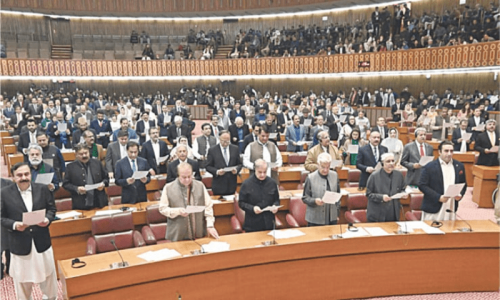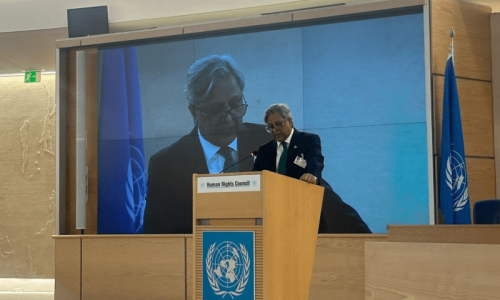
ISLAMABAD: While Pakistan appears to be ending its program with the International Monetary Fund, there's a real possibility Islamabad will have to later go back and ask for new loans, and it may not then have the critical backing of the United States.
The ruling Pakistan People's Party (PPP), fearful that economic reforms could be politically risky before senate elections in March and a parliamentary poll in 2013, has distanced itself from the Fund.
Pakistan, according to sources, has decided not to seek a new loan programme or an extension of the three-year loan package that ends on Friday.
Analysts say the government is taking the risky move of choosing short-term political gain over long-term economic stability.
If Pakistan later decides to seek a new IMF program -- and most economists think it will -- the chances of success could be hurt by a current crisis in bilateral ties with Washington.
“It is only a matter of time before we (Pakistan) go back to the IMF because our external position is just not sustainable,” said Sayem Ali, an economist at Standard Chartered Ltd.
In 2008, Pakistan averted a balance-of-payments crisis by securing -- with help from its ally the United States -- the $11 billion IMF loan on favourable terms.
At present, Pakistan can pay its bills and a government official said the economy can withstand a break with the IMF.
But there are serious doubts about financial viability beyond the fiscal year that ends in June 2012.
LITTLE CREDIBILITY
Pakistan's economy remains highly vulnerable to widening deficits and the move away from the IMF could later spawn ratings downgrades as well as make other governments and donors reluctant to give loans.
“On its own, the government has little financial credibility,” said Asif Qureshi, director of Invisor Securities.
Given the crisis in relations with the United States, which has sway in the IMF, Washington may not be willing to help Pakistan get lenient terms in any future negotiations.
It's unlikely the U.S. will “go out full force” to support Pakistan with the IMF, said Shamila Chaudhary, a Washington-based analyst at political risk firm Eurasia Group.
Ties with Washington have hit their lowest level since Pakistan joined the U.S. “war on terror” after the Sept. 11, 2001 attacks.
Washington accuses Pakistan's ISI spy agency of directly backing the Afghan Taliban-allied Haqqani group and of providing support for the Sept. 13 attack on the American embassy in Kabul.
Pakistan furiously rejected the allegations and warned the United States that it risked losing an ally if it kept publicly criticising Pakistan over the militant groups.
Pakistan's highly unpopular government has faced fierce resistance from opposition parties in the past when it tried to implement politically-explosive reforms, including ending electricity subsidies and broadening one of the world's lowest tax bases.
The ruling PPP needs to retain the support of its coalition partners to boost Senate seats. The party is acutely aware that IMF reforms are unpopular in Pakistan, where many people view the lending institution with suspicion.
Caving in to the IMF has proven costly in the past. In January, a vital coalition partner withdrew to protest fuel price rises until the government reversed its decision.
And because of failure to implement reforms, Pakistan has only secured $8 billion under its IMF loan, rather than $11 billion.
Sakib Sherani, chief executive of Macroeconomic Insights, said the government would likely defer any new IMF program until after the elections and use forex reserves for debt payments in the meantime.
Pakistan's foreign exchange reserves were $17.64 billion in the week ending Sept. 17, which cover about five to six months of import payments, and hit a record $18.31 billion in July.
But Eurasia Group's Chaudhary said that only $4 billion of the total comprises the central bank's own deposits as the remainder includes money borrowed from bilateral and multilateral donors.
Pakistan's current account deficit in the first two months of the 2011/12 fiscal year narrowed to $189 million from $1.016 billion in the same period last year.
BUILD UP
But analysts said pressure on the external front is likely to build up as IMF repayments start. According to official data, projected repayment during the year ending June 2012 is $1.37 billion, which analysts said the government could perhaps absorb.
However, a lack of inflows due to the strained relations with the United States and a slowdown in growth could put the economy in a very difficult position. Repayments to the IMF will peak in 2013-14, at $3.38 billion.
Analysts said the fiscal deficit for 2010/11 (July-June) was more than 6 percent. The government hopes to contain it at 4 percent this fiscal year, but it could be larger as the government lacks ability to use onshore bonds to fill gaps.

















































